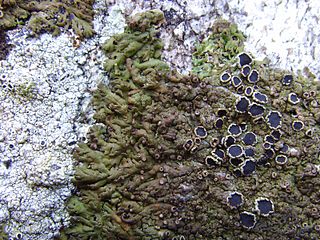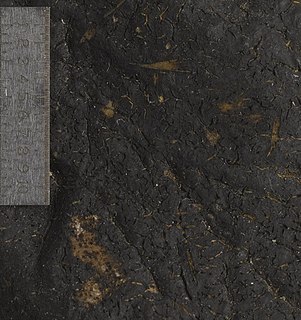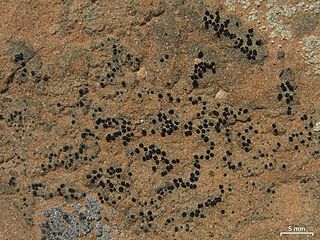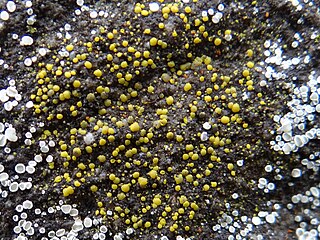
Aspicilia is a genus of mostly crustose areolate lichens that grow on rock. Most members have black apothecia discs that are slightly immersed in the areolas, hence the common name.

Bacidina is a genus of lichens in the family Ramalinaceae. It was circumscribed by Czech lichenologist Antonín Vězda in 1990, with Bacidina phacodes assigned as the type species. Vězda included 11 species in Bacidina, which was originally classified in the Lecideaceae. These species had previously been placed in genus Bacidia.

Anaptychia is a genus of lichenized fungi in the family Physciaceae.

Stigmidium is a genus of lichenicolous (lichen-eating) fungi in the family Mycosphaerellaceae. The genus was circumscribed by Italian botanist Vittore Benedetto Antonio Trevisan de Saint-Léon in 1860, with Stigmidium schaereri assigned as the type species.

Catapyrenium is a genus of lichens in the family Verrucariaceae. The genus was circumscribed by German botanist Julius von Flotow in 1850.

Thelidium is a genus of lichen-forming fungi in the family Verrucariaceae. The genus was circumscribed in 1855 by Italian lichenologist Abramo Bartolommeo Massalongo, who assigned Thelidium amylaceum as the type species.

Staurothele is a genus of saxicolous (rock-dwelling), crustose lichens in the family Verrucariaceae. It has about 40 species. When the fungus is part of a lichen, the genus of lichen is commonly called rock pimples.
Zwackhiomyces is a genus of lichenicolous fungi in the family Xanthopyreniaceae. The genus was circumscribed by Martin Grube and Josef Hafellner in 1990, with Zwackhiomyces coepulonus assigned as the type species.

Lecidella is a genus of crustose lichens in the family Lecanoraceae.

Miriquidica is a genus of lichen in the family Lecanoraceae. The genus was circumscribed in 19876 by lichenologists Hannes Hertel and Gerhard Rambold, with Miriquidica complanata assigned as the type species. According to Dictionary of the Fungi, the widespread genus contains 23 species, found predominantly in arctic-alpine regions.
Rhymbocarpus is a genus of lichenicolous (lichen-dwelling) fungi in the family Cordieritidaceae. It has 10 species. The genus was circumscribed by German mycologist Friedrich Wilhelm Zopf in 1896, with Rhymbocarpus punctiformis assigned as the type species.

Gyalecta is a genus of fungi in the family Gyalectaceae that contains 50 species. Gyalecta was circumscribed by lichenologist Erik Acharius in 1808.

Protoblastenia is a genus of lichens in the family Psoraceae. It was originally circumscribed by Alexander Zahlbruckner in 1908 as a section of genus Blastenia. J. Steiner promoted it to generic status in 1911.

Clauzadea is a genus of lichenized fungi in the family Lecideaceae. The genus contains four species found in Europe. Clauzadea was circumscribed in 1984 by lichenologists Josef Hafellner and André Bellemère.
Naetrocymbe is a genus of fungi belonging to the family Naetrocymbaceae.

Schaereria is a genus of lichen-forming fungi. It is the sole genus in the family Schaereriaceae, which itself is the only family in the Schaereriales, an order in the subclass Ostropomycetidae of the class Lecanoromycetes.

Pseudosagedia is a genus of corticolous (bark-dwelling) lichens in the family Trichotheliaceae. It was first circumscribed as a section of genus Arthopyrenia by Swiss botanist Johannes Müller Argoviensis in 1862. Maurice Choisy elevated it to distinct generic status in 1949. Pseudosagedia was little used until, in 1995, Josef Hafellner and Klaus Kalb resurrected the genus to contain members of the Porina nitidula species group with the perithecial pigment called Pseudosagedia-violet and lacking setae.













